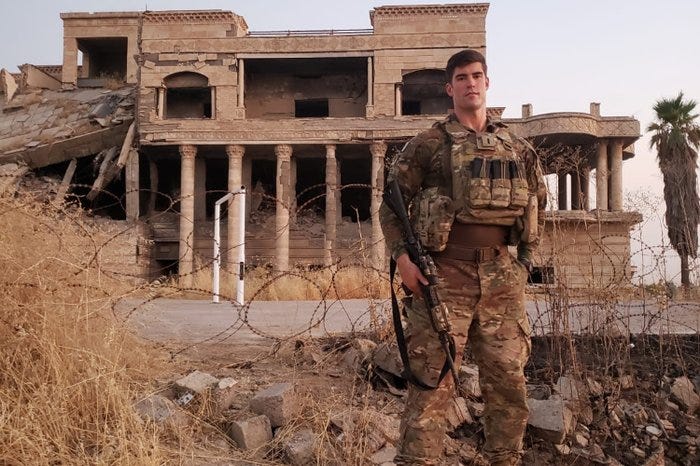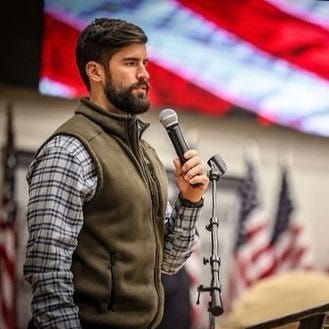Heroic former football star and Army paratrooper takes stand against mental health circlejerk
This guy rocks
College football is a big deal to a lot of people. Although I’ve never really followed it (despite going to a huge SEC school) it can be a great way for people to show pride in their schools and their states. College football is also big business, college athletics programs bring in billions of dollars each year for schools and sponsors.
It’s not surprising that, like many big businesses, college athletics programs are starting to adopt some of the politicized social trends you see everywhere now. One of these trends is that pathologization of normal life. The “behavioral health” industry, pharmaceuticals, therapy, and other techniques to respond to mental problems, brings in over $75 billion each year. The number of people seeking some form of mental health care grew by 20% from 2016 to 2020, and has probably grown even faster in recent years. This growth is buoyed by huge marketing campaigns to raise awareness of mental health issues, including those sponsored by our government.
After two humiliating defeats, University of Arkansas Razorbacks head coach Sam Pittman made headlines by criticizing social media and its impact on mental health. Pittman said:
[W]e talk about a lot of things. And one of them happens to be mental health. We need to help these kids. There’s a lot more going on in their life right now than possibly when I was a kid. And I think a lot of it has to do with this. A lot of good about this, but there’s also — if you get pulled the wrong direction with it, it can spoil your day or whatever.
Although most sports journalists praised Pittman’s remarks and focus on mental health, one man was more skeptical. That man was Jake Bequette.
Bequette was much renowned player for the Arkansas Razorbacks. He was rated Defensive MVP of the 2012 Cotton Bowl and was widely regarded as one of the best Arkansas defensive ends of his era. After college, he was drafted into the NFL by the New England Patriots and received a Super Bowl ring in 2014. Although by all accounts Bequette was a valuable member of the team, his professional football career was cut short by an injury in 2015.
After leaving the NFL, Bequette volunteered to serve his country in the US Army. He completed both Officer Candidate School and Ranger School and won a highly coveted position as an officer in the elite 101st Airborne Division. Bequette did a 5-month tour as an infantry officer in Iraq in 2019.
Bequette eventually left the military and set about helping his community in other ways. He started a non-profit to help Arkansas small businesses struggling with the unprecedented restrictions that followed the COVID-19 pandemic. Today, Bequette is a successful political commentator with his own podcast (I highly recommend subscribing).
Although Pittman’s statements on health were met with universal acclaim from sports journalists, Bequette was less impressed. Bequette wrote on Twitter:
Pittman is a smooth operator.
He needed to change the conversation after back-to-back losses, so he plays up this sob story about Twitter criticism and mental health.
He figured the media and fans would fall for it — and he was right.
This brave, controversial, and likely accurate Tweet sparked a mental health crisis of its own. Dozens of professional journalists were sent into a rage over Bequette’s casual disregard of one of the sacred cows of modern life.
Sports journalist Jacob Davis replied:
… Your opinion is tone deaf, brother. I expected a lot more from you. A man that is suppose to be a leader in this state. Instead, you’re putting people of this state down
Just because mental health is talked about more doesn’t make one weak. I’m disappointed in you, brother. Many like myself looked up to you over a decade ago… do better.
This sort of passive-aggressive and clinical policing of hard truths has become endemic in our society. Many other sports journalists made similar responses, from loudly and dubiously proclaiming that they don’t actually care about what he has to say to threatening to leak alleged old text messages.
Arkansas sports journalism seems to have become the Longhouse so eloquently described by internet commentator Lomez in his highly-influential essay for First Things magazine. Unable to substantively respond to what Bequette has to say, they gossip and conspire against him. They shriek and attack while demanding that he “do better.” Bequette, who has a history of success in high pressure positions, is being diagnosed over the internet with mental health problems of his own. In short, no one is allowed to go against the herd. Everyone must be slavishly devoted to “acknowledging mental health issues,” despite the growing body of evidence that at least some of the “treatments” today seem to be making people worse.
Bequette, to his immense credit, is fighting a one-man war against his critics on Twitter. Although Bequette is no longer a professional athlete or US Army paratrooper, he clearly takes good care of himself. His critics are often androgenous and slovenly looking. Bequette pointedly asked one critic what his pronouns were, then, when the critic came back with a snarky response about Bequette’s appearance, Bequette replied:
In that photo, I was in the middle of an all-SEC season and a captain on a winning team.
In your photo, you are an effeminate, low-IQ beat writer crying about mental health issues.
We are not the same.
This incident is part of a larger counter-offensive by sports personalities against the new liberal dominance of sectors that were typically associated with conservative culture in the past.
Former Auburn football coach Senator Tommy Tuberville has almost single-handedly held up all promotions for the senior ranks of the US military in protest over barely-disguised far left activism being pushed and funded by the Pentagon. However much the newly woke masses in the US military may complain, Tuberville is not taking any of their bullshit.
Although professional sports have gotten a bad reputation over the last few years, largely for good reasons, leaders like Bequette and Tuberville could represent the turning of the tide. Whatever the outcome of this new trend, the virtues that always associated with sports: courage, teamwork, and personal initiative, will be invaluable in coming years. The pity party is cancelled. America wants winners.
This story is still developing. Please follow Bequette on Twitter and give him the support he deserves.







"Conundrum Cluster is a Harvard and Cambridge-educated classical historian... his only friends growing up were a rattlesnake and an alligator."
Stop trying to shine us on with the man-of-the-people SEC act, pal. IM1776's impeccable fact checking department has already put paid to your noxious lies.
Some things someone will gripe about eventually: Ranger school is basically finishing school for industry officers (and NCOs) and isn’t the same thing as being in the 75th Ranger Regiment (who is typically referred to as an Army Ranger). Also 101st is “just” ‘air assault’ division, elite would be maybe a term of opinion but they are no different from any other infantry division really. These same things came up around Tom Cotton referring to himself as an Army Ranger. Just FYI, enjoy the sub.